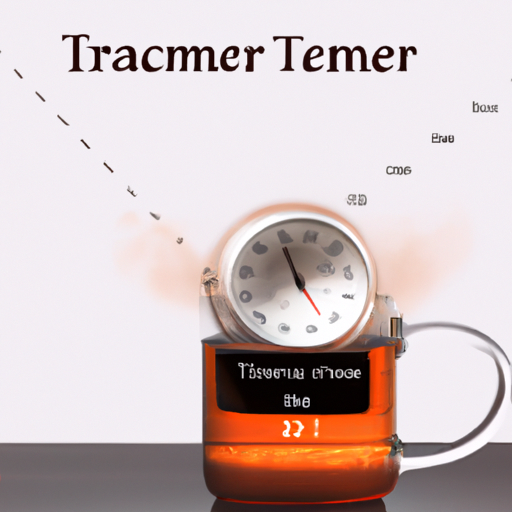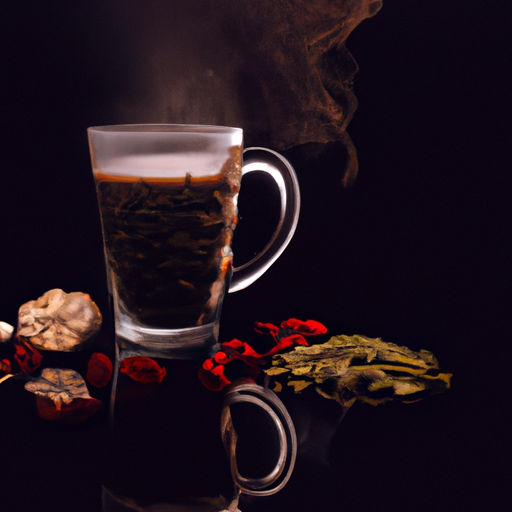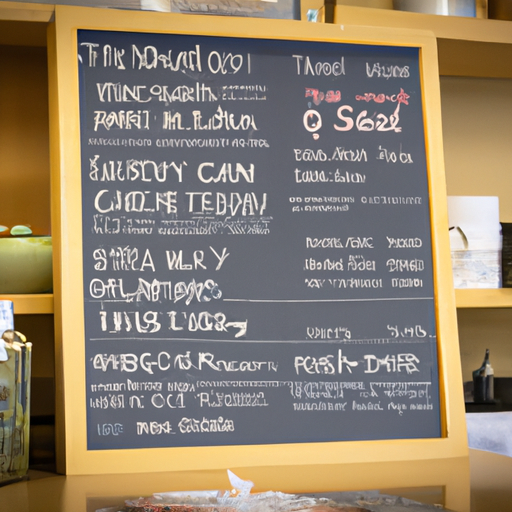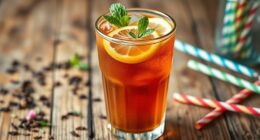As someone passionate about tea, I’m continually surprised by how many individuals aren’t aware of the significance of steeping tea at the proper temperature. Were you aware that each variety of tea requires an optimal temperature for brewing?
For example, black tea should be brewed at 212°F (100°C), while green tea is best brewed between 160-180°F (71-82°C). But what about chai? In this article, we’ll explore what temperature to brew chai tea and why it’s important for achieving the perfect cup.
Chai is a popular spiced tea that originated in India and is now enjoyed all over the world. It’s made by combining black tea with spices like cinnamon, cardamom, ginger, and cloves. The result is a flavorful and aromatic beverage that can be enjoyed hot or cold.
However, because of its unique blend of ingredients, chai requires special attention when it comes to brewing. In this article, we’ll break down the components of chai and provide tips on how to achieve the ideal brewing temperature for your next cup.
Key Takeaways
- The ideal brewing temperature for chai tea is around 200°F (93°C).
- Temperature control is essential to bring out the full flavor of chai tea.
- Milk should be heated to a temperature between 140-160°F (60-71°C) when making chai tea.
- Different blends of chai may require different brewing times.
The Importance of Brewing Temperature
You gotta make sure you’re using the right temperature when brewing chai tea, otherwise you’ll end up with a bland or bitter cup. Temperature control is essential in bringing out the full flavor of chai tea. The ideal temperature for brewing chai tea is around 200°F (93°C).
The importance of temperature control lies in its effect on the flavor profile of your cup of chai tea. If brewed at too high a temperature, the spices and herbs used to make chai can become bitter, overpowering and leave an unpleasant aftertaste. On the other hand, if brewed at too low a temperature, your cup might end up tasting weak and lackluster.
Understanding the components of chai tea is important to get that perfect brew. So let’s delve into what makes up this delicious beverage!
Understanding the Components of Chai Tea
I’d like to talk about the different components that make up a delicious cup of chai tea.
First and foremost are the spices – cinnamon, cardamom, ginger, cloves, and black pepper all come together to create that signature chai flavor.
Next is the milk – it can be cow’s milk, almond milk, soy milk, or any other type you prefer.
Finally, we have the black tea base which provides a robust and flavorful foundation for all those spices and creamy textures to shine through.
Spices
What kind of spices do I typically use when brewing a warm cup of chai tea?
There are various varieties of chai tea, each with unique spice blends. However, the most common ingredients in a traditional Indian chai recipe include cardamom, cinnamon, ginger, and cloves. These spices are known for their warming and soothing properties that help to balance the body’s energy.
When it comes to pairings, some people like to add black pepper or nutmeg to their chai tea for an extra kick. Others prefer to keep it simple and only stick with the basic ingredients. It all comes down to personal preference. Whatever spices you choose, make sure they’re fresh and high-quality as this will affect the overall taste of your beverage.
Moving on from discussing spices, let’s now talk about another essential ingredient in making chai tea – milk.
Milk
Adding milk to your warm and comforting cup of spiced goodness is a must for achieving that creamy and smooth texture. But how do you make sure the milk is at the right temperature? You don’t want it scorching hot or too cold, ruining the taste of your chai tea.
One way to heat up milk is by steaming it. This process involves using a steam wand on an espresso machine to heat up and froth the milk simultaneously. Another option is frothing the milk separately in a frother, which can be done manually or with an electric device. Either way, aim for a temperature between 140-160°F (60-71°C) for the perfect cup of chai tea with milk.
Now, let’s move onto brewing black tea as the base for our spiced drink.
Black Tea
To make your perfect cup of spiced goodness, you’ll want to start with black tea as the base, which contains about half the caffeine of a cup of coffee. Black tea provides a robust and bold flavor profile that pairs well with the warm spices commonly found in chai tea.
In addition to its delicious taste, black tea also offers numerous health benefits such as improved heart health and increased mental alertness. Here are five key things to keep in mind when selecting black tea for your chai recipe:
- Choose high-quality loose leaf black tea for the best flavor.
- Look for teas from regions like Darjeeling or Assam for a more authentic taste.
- Consider opting for organic or fair trade options that are sustainably sourced.
- Experiment with different types of black teas such as Ceylon or Keemun to find your preferred flavor profile.
- Avoid using flavored teas, as they may clash with the spices used in traditional chai recipes.
When brewing chai tea, there are several factors to consider beyond just selecting the right type of black tea.
Factors to Consider When Brewing Chai Tea
When I brew chai tea, there are three key factors that I always consider: the type of tea leaves, the quality of water, and the brewing time.
The type of tea leaves will affect the strength and flavor of the chai, so it’s important to choose ones that complement the other ingredients.
Water quality is also crucial because it can impact the taste and aroma of the tea.
Finally, brewing time plays a significant role in determining how strong or weak the chai will be.
By paying attention to these factors, I can ensure that my chai is always delicious and satisfying.
Type of tea leaves
If you want a bold flavor, go for black tea leaves when brewing your chai tea. Different types of chai blends may call for different tea leaves, so it’s important to know what kind of blend you’re working with before selecting a type of tea. Here are some tips on how to choose the right type of tea leaves for your chai brew:
-
Black Tea: This is the most traditional and common type of tea used in chai blends. It has a strong flavor and holds up well against the spices typically used in chai.
-
Green Tea: For those who prefer a lighter taste, green tea can be a good option. However, it may not hold up as well against the spices in chai and can result in a weaker overall flavor.
-
White Tea: This delicate type of tea may not be ideal for use in chai blends as it can easily be overwhelmed by the strong flavors of the spices.
-
Herbal Tea: While not technically a true ‘tea’since it doesn’t come from the Camellia sinensis plant, herbal teas such as rooibos or chamomile can make for interesting and unique twists on traditional chai blends.
When choosing your tea leaves, remember that loose leaf is generally considered to be better than pre-bagged options since it allows for more control over strength and flavor extraction. With your chosen blend and brewing method in mind, select your preferred type of loose leaf tea and get ready to brew!
To ensure that your brewed chai tastes its best, you’ll also want to pay attention to water quality – but we’ll delve into that topic more in our next section!
Water quality
I hope you enjoyed learning about the different types of leaves used for chai tea. Now, let’s talk about the importance of water quality when brewing this delicious beverage.
Proper water filtration is crucial for producing a high-quality cup of chai tea. Impurities in tap water can negatively impact the taste and aroma of your tea. To avoid this, consider using filtered or bottled water instead.
Another factor to consider is the type of brewing vessel you use. A stainless steel pot or ceramic teapot are great options as they don’t affect the flavor of your tea like plastic or aluminum may.
Now that we’ve discussed how important it is to use filtered water and a suitable brewing vessel, let’s move on to our next topic: brewing time.
Brewing time
To achieve the perfect cup of spiced goodness, steeping your chai for around five minutes allows the flavors to meld together, creating a warm and aromatic experience. However, factors affecting brewing time can vary depending on personal preference and tea blend.
Here are some things to consider when experimenting with steeping duration:
- Tea Blend: Different blends of chai may require different brewing times to bring out their full flavor profile.
- Water Temperature: The temperature of the water used can also affect how quickly the flavors are infused into the tea.
- Desired Strength: Depending on how strong you want your chai, you may need to adjust your brewing time accordingly.
When it comes to finding your ideal brew time for chai tea, it’s all about experimentation and personal taste preferences. Once you’ve found the perfect duration for your specific blend of tea and desired strength, you’ll be able to enjoy a consistently delicious cup every time.
Now let’s move on to discussing the ideal brewing temperature for chai tea.
Ideal Brewing Temperature for Chai Tea
While some may argue that any temperature is suitable for brewing chai tea, it’s a well-known fact among connoisseurs that the ideal temperature lies between 195-205°F. This range ensures the perfect balance of flavor and aroma from the spices used in chai tea.
It’s important to note that boiling water can extract bitter flavors from certain spices, which can ruin the overall taste of your chai. When brewing chai tea at this ideal temperature, you’ll be able to unlock its full potential.
The spices will release their oils and flavors without overpowering each other. You’ll be able to taste each ingredient individually while still enjoying a balanced and complex flavor profile. Additionally, steeping your chai at this temperature allows for a smoother mouthfeel and eliminates any harshness or bitterness.
To achieve this optimal brewing temperature, I recommend using an electric kettle with precise temperature settings or a candy thermometer to check the water’s temperature before adding it to your ingredients. By doing so, you’ll have more control over the brewing process and ensure that you’re getting the most out of your chai tea experience.
Recommended Tools for Brewing Chai Tea
When it comes to brewing chai tea, having the right tools can make all the difference.
From personal experience, I highly recommend using a tea kettle with a spout for easy pouring and control over water flow.
A thermometer is also essential for ensuring your water temperature is just right, while a good quality tea strainer will help ensure a smooth and flavorful cup of chai every time.
Tea kettle
Using a tea kettle is the quickest and easiest way to brew a perfect cup of chai tea. The first step in choosing the right tea kettle is to decide on the material that suits your needs.
A copper or stainless steel kettle is ideal as it heats up quickly and evenly, allowing for an efficient brewing process. These materials also retain heat well, keeping your chai warm for longer periods.
Tea kettle maintenance is crucial in ensuring that your chai always tastes fresh. After each use, rinse out any remaining tea leaves or residue and dry the kettle thoroughly before storing it away.
If you notice any build-up or discoloration on the surface of your kettle, remove it using vinegar or lemon juice mixed with water. With proper care, your tea kettle can last for years and deliver many delicious cups of chai tea.
As we move onto discussing thermometers as another essential tool for brewing chai tea, keep in mind how having a reliable tea kettle will make this process much smoother.
Thermometer
Get ready to discover the secret weapon for achieving the perfect cup of your favorite hot beverage – a thermometer. Measuring accuracy is crucial in achieving consistent results when brewing chai tea, and a digital or analog thermometer can help with that.
Digital thermometers offer faster and more accurate readings, while analog ones require calibration but can be more reliable over time. It’s important to calibrate your thermometer periodically to ensure it’s still accurate.
Temperature control methods, such as adjusting heat sources or using a double boiler, can also impact the final temperature of your water. Fluctuations in altitude and humidity can affect the boiling point of water, so it’s essential to account for those variables as well.
The temperature at which you brew your chai tea will have an impact on its flavor profile – lower temperatures create lighter flavors while higher ones yield bolder tastes. In fact, temperature is so critical in tea brewing that there are even competitions focused solely on this aspect of the process!
Understanding the science behind tea brewing will help you achieve consistently delicious cups every time.
Now that we’ve covered thermometers and their importance in achieving precise temperature control when brewing chai tea, let’s move on to another equally important tool – a tea strainer.
Tea strainer
To achieve a smooth and enjoyable cup of your favorite beverage, don’t forget to grab a tea strainer before steeping! Tea brewing techniques vary depending on the type of tea you’re using, but one thing is certain: using a tea strainer ensures that any loose leaves or spices are kept out of your final drink.
There are different types of tea strainers available in the market, each with their own unique benefits. One popular type is the mesh ball infuser, which is great for larger leaf teas like black or oolong. Another option is the basket infuser which can be used for both large and small leaf teas. Some people prefer reusable cloth bags as they’re environmentally friendly and easy to clean.
Whichever type you choose, make sure it fits well in your mug or teapot and allows enough space for water to circulate around the leaves. Now that we have our tea strainer ready, let’s move on to how to measure the temperature of water.
How to Measure the Temperature of Water
Feeling a bit lost? Don’t worry, checking the water temperature is as easy as feeling the warmth of the sun on your skin. Measuring accuracy is key to brewing a perfect cup of chai tea.
Different temperature scales are used to measure water temperature, but the most common ones are Fahrenheit and Celsius. To accurately measure the temperature of water for brewing chai tea, you’ll need a thermometer. Digital thermometers are more precise and easier to use than traditional mercury or alcohol-based ones.
To ensure an accurate reading, place the thermometer probe in the center of the liquid and wait for it to stabilize before taking a reading. Now that you know how to measure water temperature for brewing chai tea, let’s move on to preparing this delicious beverage.
Start by boiling water in a kettle or pot until it reaches 190-200°F (90-95°C) depending on your preference. This step is crucial because if you don’t get the right temperature, your tea might end up too weak or too strong.
Step-by-Step Guide to Brewing Chai Tea
First, start by filling a small pot with water and adding your desired spices and sweeteners. You can choose from a wide range of options, such as cinnamon sticks, cardamom pods, ginger root, cloves, or black pepper. These spices will infuse the water with their unique flavors and aromas, creating a complex and rich brew that is perfect for chai tea.
Next, heat the pot over medium-high heat until the water comes to a boil. Then lower the heat to medium-low and let it simmer for about 10-15 minutes. This slow and gentle brewing technique will allow the spices to release their oils and essences without becoming too bitter or overpowering. You can adjust the brewing time based on your personal preferences for strength and intensity.
After you have brewed your chai tea to perfection, strain it through a fine-mesh sieve or cheesecloth into a teapot or mug. You can serve it hot or cold depending on your mood and taste. Some people like to add milk or creamer to their chai tea for a creamier texture and milder flavor profile. Others prefer to enjoy it plain or with a dash of honey or sugar for sweetness.
Brewing chai tea requires some basic techniques and attention to detail in order to achieve optimal results. By using high-quality ingredients, measuring the temperature of water accurately, selecting appropriate spices and sweeteners, simmering slowly over low-medium heat, and straining carefully after brewing, you can create an authentic cup of chai tea that is both deliciously aromatic and satisfyingly flavorful. However, there are also some tips for adjusting brewing temperature that may help you refine your recipe even further – read on to find out more!
Tips for Adjusting Brewing Temperature
If you want to elevate your brewing game, there’s a simple trick you can try – pay attention to the size and shape of your pot or kettle. This is because the temperature at which you brew chai tea depends on how much water you’re using and the type of tea blend you have.
Generally, for a single cup of chai, boiling water is recommended. However, if you’re brewing a larger batch, it’s best to let the water cool down slightly before adding the tea leaves.
Another factor that might affect the temperature at which you brew chai tea is how spicy or strong you like it. If you prefer a milder flavor with less spice, then use cooler water when steeping your tea leaves. On the other hand, if spiciness is what makes chai special for you, then consider using hotter water than usual.
Keep in mind that adjusting spiciness also involves choosing different blends of tea leaves with varying levels of aroma and taste.
Choosing the right temperature for brewing chai can make all the difference in creating a perfect cuppa every time. However, it’s not just about temperature; several other factors can affect your final result too.
In the next section, we’ll discuss some common mistakes people make when brewing chai tea that could ruin its flavor and aroma. So keep reading to learn more about how to avoid these pitfalls!
Common Mistakes to Avoid When Brewing Chai Tea
When I brew chai tea, there are a few common mistakes that I always watch out for.
First and foremost, overheating the tea can quickly ruin its flavor and aroma.
Oversteeping is another mistake to avoid, as it can make the tea too bitter or astringent.
Finally, not straining the tea properly before serving can result in a gritty and unpleasant texture that detracts from the overall experience.
By paying close attention to these key points, you can ensure that your chai tea is brewed perfectly every time.
Overheating
Brewing chai tea at too high a temperature can ruin the delicate balance of flavors, leaving behind a bitter taste that is sure to disappoint even the most ardent of chai lovers. To prevent overheating, it’s important to follow some best brewing practices for chai tea.
It’s recommended to heat water until just under boiling point (around 195-205°F) before steeping your tea leaves. This ensures that the flavors are properly extracted without compromising on their quality.
It’s also crucial to keep an eye on the steeping time while brewing your chai tea. Oversteeping can lead to bitterness and astringency in your drink, which you definitely want to avoid. So make sure you set a timer for around 3-5 minutes depending on whether you’re using loose or bagged tea leaves.
With these tips in mind, you’ll be able to brew a perfect cup of chai every time – one that is fragrant, flavorful and balanced in taste!
Oversteeping
Like a thief stealing the sweetness from a ripe fruit, oversteeping can rob your cup of its delectable flavors and leave you with a bitter taste in your mouth. To avoid bitterness in your chai tea, it’s essential to pay close attention to the steeping time.
Steeping too long can result in an overpowering flavor that masks the delicate balance of spices. To achieve the perfect brew, follow these tips for avoiding bitterness:
- Start with fresh ingredients
- Use water at the right temperature (around 200°F)
- Steep for no longer than five minutes
- Taste frequently to monitor flavor intensity
By following these guidelines, you’ll be able to enjoy a perfectly balanced cup of chai tea every time.
Now that we’ve covered how to avoid bitterness through proper steeping, let’s move on to another important aspect: not straining.
Not straining
To fully appreciate the rich flavors of your homemade spiced drink, make sure you strain out any loose particles before sipping. Not straining your chai tea could lead to an unpleasant drinking experience, as it can leave behind gritty residue and spices that settle at the bottom of your cup. This can also affect the taste of your tea and make it feel chunky in texture.
However, if you don’t have a strainer on hand or prefer not to use one, there are alternative brewing methods that allow you to enjoy all the health benefits of chai without having to strain it. One such method is using a French press, which has a built-in filter that separates the liquid from any remaining particles.
Another option is steeping your chai tea in a muslin cloth or cheesecloth bag, which allows for easy removal of any loose bits. Regardless of which method you choose, make sure to avoid oversteeping and keeping an eye on the temperature so as not to burn or overcook your tea leaves.
Frequently Asked Questions
What are the health benefits of chai tea?
Have you ever wondered what makes chai tea such a popular drink around the world? As someone who enjoys exploring the rich flavors of chai tea, I can tell you that it offers a range of health benefits and more.
Chai tea is known to boost immunity, aid digestion, reduce inflammation, and improve heart health. In addition to these benefits, it also contains antioxidants that help protect your body from free radicals.
But what really sets chai tea apart is its unique blend of spices like cinnamon, ginger, cardamom, and cloves that give it its signature flavor profile. So if you’re looking for a delicious and healthy beverage option, reach for a cup of chai tea and savor all it has to offer!
Can I use any type of tea leaves to make chai tea?
When it comes to making chai tea, you can experiment with different types of tea leaves for varying flavors. Traditionally, black tea leaves serve as the base for chai. However, you may try green or white tea leaves as well. Keep in mind that using a different tea leaf can affect the taste profile, and you may need to adjust the balance of spices and sweetness.
Moreover, there are many variations of chai recipes that incorporate different combinations of herbs and spices. Don’t hesitate to get creative and try out new flavors until you find your favorite blend.
How long should I steep chai tea for?
Steeping chai tea is an art that requires patience and precision. Depending on your brewing techniques, you can achieve different flavor variations. To answer the current question, I recommend steeping chai tea for 3-5 minutes. This will allow the flavors to fully develop and infuse into the water, resulting in a well-balanced cup of tea.
However, keep in mind that over-steeping can lead to bitterness and astringency in the tea. So, it’s essential to pay close attention to the timing while steeping chai tea. By mastering this skill, you can create a perfect cup of chai with rich flavors and aromas that will soothe your senses and warm your soul.
As they say, "A sip of chai is like a hug in a mug."
Is it necessary to add milk and sugar to chai tea?
When it comes to chai tea, adding milk and sugar is a matter of personal preference. While traditional chai recipes call for the addition of both, there are plenty of alternatives available for those who prefer a dairy-free or lower-sugar option.
Milk alternatives like almond milk, coconut milk, or oat milk can be used instead of dairy milk to create a creamy texture without the lactose. Similarly, spices like cinnamon or cardamom can add natural sweetness without the need for added sugar.
Ultimately, how you choose to enjoy your chai is up to you. Experiment with different flavors and ingredients until you find the perfect combination that suits your taste buds.
Can I reuse chai tea leaves for a second brew?
When it comes to reusing chai tea leaves, there is definitely some potential for getting a decent second brew out of them. However, the flavor profile will be quite different from the first cup, and it’s important to keep that in mind.
I’ve found that when brewing with used chai tea leaves, the resulting tea has a much lighter flavor overall. The spices in particular tend to be more subdued, so if you’re looking for that classic chai taste, you may need to start fresh with new leaves. That being said, there are still nuances to be explored when reusing chai tea leaves – maybe try experimenting with longer steeping times or adding extra spices to compensate for the weaker flavors.
Ultimately though, it really depends on personal preference whether or not to reuse your leaves.
Conclusion
In conclusion, brewing chai tea at the right temperature is crucial for achieving a perfect cup of this beloved beverage. There are several factors to consider when brewing chai tea, including the type of tea leaves used and personal taste preferences. It’s important to use the recommended tools and accurately measure water temperature to ensure proper brewing.
Brewing chai tea can be an art form that requires patience and attention to detail. Just like a painter carefully brushes strokes onto canvas or a chef meticulously plates their dishes, brewing chai tea at the ideal temperature allows for all the flavors and aromas to come together harmoniously.
By adjusting brewing temperature as needed and avoiding common mistakes, you can achieve a delicious cup of chai tea that will warm your soul with every sip. So go ahead and indulge in this comforting drink it’s time well-spent!










